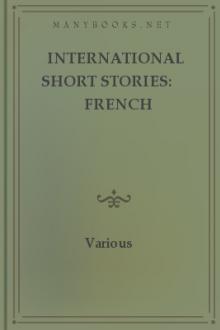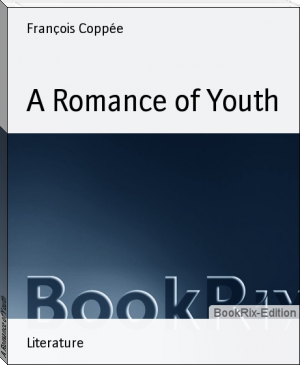International Short Stories: French - - (new books to read .TXT) 📗

- Author: -
- Performer: -
Book online «International Short Stories: French - - (new books to read .TXT) 📗». Author -
Babet had stood upright. She held out little Marie to me:
“Take the child,” she exclaimed. “Leave me alone, leave me alone!”
Jacques had already caught Babet in his arms. In a loud voice he said:
“Father, save the little one—I will save mother.”
We had come close to the black mass. I thought I recognised a tree. The shock was terrible, and the raft, split in two, scattered its straw and beams in the whirlpool of water.
I fell, clasping little Marie tightly to me. The icy cold water brought back all my courage. On rising to the surface of the river, I supported the child, I half laid her on my neck and began to swim laboriously. If the little creature had not lost consciousness but had struggled, we should both have remained at the bottom of the deep.
And, whilst I swam, I felt choking with anxiety. I called Jacques, I tried to see in the distance; but I heard nothing save the roar of the waters, I saw naught but the pale sheet of the Durance. Jacques and Babet were at the bottom. She must have clung to him, dragged him down in a deadly strain of her arms. What frightful agony! I wanted to die; I sunk slowly, I was going to find them beneath the black water. And as soon as the flood touched little Marie’s face, I struggled again with impetuous anguish to get near the waterside.
It was thus that I abandoned Babet and Jacques, in despair at having been unable to die with them, still calling out to them in a husky voice. The river cast me on the stones, like one of those bundles of grass it leaves on its way. When I came to myself again, I took my daughter, who was opening her eyes, in my arms. Day was breaking. My winter night was at an end, that terrible night which had been an accomplice in the murder of my wife and son.
At this moment, after years of regret, one last consolation remains to me. I am the icy winter, but I feel the approaching spring stirring within me. As my uncle Lazare said, we never die. I have had four seasons, and here I am returning to the spring, there is my dear Marie commencing the everlasting joys and sorrows over again.
BARON DE TRENCK By Clemence Robert
Baron de Trenck already had endured a year of arbitrary imprisonment in the fortress of Glatz, ignorant alike of the cause of his detention or the length of time which he was destined to spend in captivity.
During the early part of the month of September, Major Doo, aide to the governor of the prison of Glatz, entered the prisoner’s apartment for a domiciliary visit, accompanied by an adjutant and the officer of the guard.
It was noon. The excessive heat of the dying summer had grown almost unsupportable in the tower chamber where Baron de Trenck was confined. Half empty flagons were scattered among the books which littered his table, but the repeated draughts in which the prisoner had sought refreshment had only served to add to his ever-increasing exasperation.
The major ransacked every nook and corner of the prisoner’s chamber and the interior of such pieces of furniture as might afford a possible hiding-place. Remarking the annoyance which this investigation caused the baron, Doo said arrogantly:
“The general has issued his orders, and it is a matter of little consequence to him whether or not they displease you. Your attempts to escape have greatly incensed him against you.”
“And I,” retorted Trenck, with like hauteur, “am equally indifferent to your general’s displeasure. I shall continue to dispose of my time as may best please me.”
“Good!” replied the major, “but in your own interests you would be wiser to philosophize with your books, and seek the key to the sciences, rather than that of the fortress.”
“I do not need your advice, major,” the baron observed, with sovereign disdain.
“You may perhaps repent later that you did not heed it. Your attempts to escape have angered even the king, and it is impossible to say just how far his severity toward you may go.”
“But, great heavens! when I am deprived of my liberty without cause, have I not the right to endeavor to regain it?”
“They do not see the matter in that light in Berlin. As a matter of fact this spirit of revolt against your sovereign only serves to greatly aggravate your crime.”
“My crime!” Trenck exclaimed, trembling with anger.
His glance fell upon the major’s sword and the thought came to him to tear it from his side and pierce his throat with it. But in the same instant it occurred to him that he might rather profit by the situation. Pale and trembling as he was, he retained sufficient self-control to modify the expression of his countenance and the tone of his voice, though his glance remained fixed upon the sword.
“Major,” he said, “no one can be called a criminal until he has been so adjudged by the courts. Happily a man’s honor does not depend upon the inconsequent, malicious opinion of others. On the contrary blame should attach to him who condemns the accused without a hearing. No constituted power, whether that of king or judge, has yet convicted me of any culpable action. Apart from the courtesy which should be observed between officers of the same rank, you, out of simple justice, should refrain front such an accusation.”
“Every one knows,” retorted Boo, “that you entered into relations with the enemy.”
“I? Great God!”
“Do you not consider the Pandours, then, as such?”
“I visited their chief solely as a relative. A glass of wine shared with him in his tent can hardly be construed into a dangerous alliance!”
“But you hoped to inherit great riches from this relative. That hope might well impel you to cross the frontier of Bohemia for all time.”
“Why, what egregious folly! What more could I hope for than that which I already possessed in Berlin? Was I a poor adventurer seeking his fortune by his sword? Rich in my own right; enjoying to the full the king’s favor; attached to the court by all that satisfied pride could demand, as well as by ties of the tenderest sentiments. What more was there for me to covet or to seek elsewhere?”
The major turned his head aside with an air of indifference.
“One single fact suffices to discount everything you have said, Baron,” he replied dryly. “You have twice attempted to escape from the fortress. An innocent man awaits his trial with confidence, knowing that it cannot be other than favorable. The culprit alone flees.”
Trenck, though quivering with blind rage, continued to maintain his former attitude, his features composed, his eyes fixed upon the major’s sword.
“Sir,” he said, “in three weeks, on the twenty-fifth of September, I shall have been a prisoner for one year. You in your position may not have found the time long, but to me it has dragged interminably. And it has been still harder for me to bear because I have not been able to count the days or hours which still separate me from justice and liberty. If I knew the limit set to my captivity—no matter what it may be—I could surely find resignation and patience to await it.”
“It is most unfortunate, then,” said the major, “that no one could give you that information.”
“Say rather, would not,” replied Trenck. “Surely, something of the matter must be known here. You, for instance, major, might tell me frankly what you think to be the case.”
“Ah!” said Doo, assuming the self-satisfied manner of a jailer; “it would not be proper for me to answer that.”
“You would save me from despair and revolt,” replied Trenck warmly. “For I give you my word of honor that from the moment I know when my captivity is to terminate—no matter when that may be, or what my subsequent fate—I will make no further attempts to evade it by flight.”
“And you want me to tell you——”
“Yes,” interrupted Trenck, with a shudder; “yes, once again I ask you.”
Doo smiled maliciously as he answered:
“The end of your captivity? Why, a traitor can scarcely hope for release!”
The heat of the day, the wine he had drunk, overwhelming anger and his fiery blood, all mounted to Trenck’s head. Incapable of further self-restraint, he flung himself upon the major, tore the coveted sword from his side, dashed out of the chamber, flung the two sentinels at the door down the stairs, took their entire length himself at a single bound and sprang into the midst of the assembled guards.
Trenck fell upon them with his sword, showering blows right and left. The blade flashed snakelike in his powerful grasp, the soldiers falling back before the fierce onslaught. Having disabled four of the men, the prisoner succeeded in forcing his way past the remainder and raced for the first rampart.
There he mounted the rampart and, never stopping to gauge its height, sprang down into the moat, landing upon his feet in the bottom of the dry ditch. Faster still, he flew to the second rampart and scaled it as he had done the first, clambering up by means of projecting stones and interstices.
It was just past noon; the sun blazed full upon the scene and every one within the prison stood astounded at the miraculous flight in which Trenck seemed to fairly soar through the air. Those of the soldiers whom Trenck had not overthrown pursued, but with little hope of overtaking him. Their guns were unloaded so that they were unable to shoot after him. Not a soldier dared to risk trying to follow him by the road he had taken, over the ramparts and moats; for, without that passion for liberty which lent wings to the prisoner there was no hope of any of them scaling the walls without killing himself a dozen times over.
They were, therefore, compelled to make use of the regular passages to the outer posterns and these latter being located at a considerable distance from the prisoner’s avenue of escape, he was certain, at the pace he was maintaining, to gain at least a half-hour’s start over his pursuers.
Once beyond the walls of the prison, with the woods close by, it seemed as if Trenck’s escape was assured beyond doubt.
He had now come to a narrow passageway leading to the last of the inner posterns which pierced the walls. Here he found a sentinel on guard and the soldier sprang up to confront him. But a soldier to overcome was not an obstacle to stop the desperate flight of the baron. He struck the man heavily in the face with his sword, stunning him and sending him rolling in the dust.
Once through the postern there now remained only a single palisade or stockade—a great fence constructed of iron bars and iron trellis-work, which constituted the outermost barrier between the fleeing prisoner and liberty. Once over that iron palisade he had only to dash into the woods and disappear.
But it was ordained that Trenck was not to overcome this last obstacle, simple as it appeared. At a fatal moment, his foot was caught between two bars of the palisade and he was unable to free himself.
While he was engaged in superhuman but futile efforts to release his foot, the sentinel of the passage, who had picked himself up, ran through the postern toward the palisade, followed by another soldier from the garrison. Together they fell upon Trenck, overwhelming him with blows with the butts of their muskets and secured him.
Bruised and bleeding he was borne back to his cell.
Major Doo informed Trenck, after this abortive attempt to escape, that he had been condemned to one year’s imprisonment only. That





Comments (0)